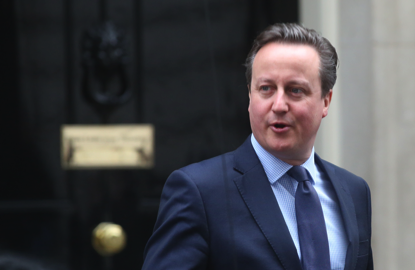
(June 20): Prime Minister David Cameron entered the final week of campaigning ahead of the UK’s referendum on European Union membership with an accusation that his opponents are trying to deceive people into voting to leave.
After 2 1/2 days when campaigning was suspended following the murder of Labour lawmaker Jo Cox, Sunday saw both sides return to the fray. The prime minister, taking audience questions on a BBC television special, criticised his opponents both over the tone of some of their anti-immigration messages and specific claims they’ve made.
He singled out their assertions that Turkey is joining the EU; that Britain would have to sign up to a European army; and that EU membership costs Britain 350 million pounds ($674 million) a week as examples of lies by his opponents.
“I’m sure there are arguments for leaving, but those three, which are the three leading things on their leaflets, are simply not true,” a visibly riled Cameron said. “It would be a tragedy if we damaged our economy and wrecked job prospects in our country on the basis of three things that are completely untrue.”
The referendum on June 23 is being watched by governments and investors all around the world amid worries that a so-called Brexit would spark a wave of turmoil across global markets. Polls suggest the result is still too close to call. The pound rose against the dollar in early Monday trading in Asian markets, following polls published Sunday showing “Remain” regaining the lead that it had lost in recent weeks.
Elsewhere in the campaign:
• Ten Nobel-winning economists wrote to the Guardian newspaper saying Britain is better off inside the EU
• German Finance Minister Wolfgang Schaeuble said EU policy makers have safeguards in place to avoid “chaotic developments” should Britons vote to leave
• The pressure group Migration Watch said migrants cost the UK as much as 17 billion pounds a year, without explaining how it arrived at the figure
• Former Conservative Party Chairwoman Sayeeda Warsi told The Times newspaper she has switched to “Remain” from “Leave” over the campaign’s anti-immigration rhetoric
In his BBC appearance, Cameron repeated his message that departing the EU would be a risk, and that most economists warn it would damage the economy.
“When I’m thinking of buying a house, I listen to an expert,” he said. “When I’m thinking of getting into a car, I listen to the mechanic. If I want to build a bridge, I want an engineer. People in the ‘Leave’ campaign are asking you to trust in just a sense that it’s going to be OK. I don’t think that’s good enough.”
‘Didn’t Quit’
It was when an audience member suggested to the prime minister that he resembled Neville Chamberlain, who appeased Adolf Hitler before World War II, that Cameron became most passionate.
“At my office I sit two yards away from the Cabinet Room where Winston Churchill decided in May 1940 to fight on against Hitler -- the best and greatest decision anyone has made in our country,” Cameron said. “He didn’t want to be alone, he wanted to be fighting with the French and with the Poles and with the others, but he didn’t quit. He didn’t quit on Europe, he didn’t quit on European democracy, he didn’t quit on European freedom.”
The programme opened with Cameron remembering Cox. “The most important thing for the politicians is to remember what she was all about, which was service, community, tolerance,” he said. “Wherever we see intolerance, hatred, division, we should try and drive it out of our communities, out of our public life.”
‘Been a Victim’
Earlier on Sunday, leading “Leave” campaigners were challenged in their own television appearances about the tone of the language they’d used in the Brexit debate. Asked if he had stoked up hatred, UK Independence Party leader Nigel Farage rejected the charge.
“I think I have been a politician who has been a victim of it, to be honest with you,” he told ITV. “When you challenge the establishment in this country, they come after you, they call you all sorts of things.”
Thomas Mair, charged with Cox’s murder, gave his name as “death to traitors, freedom for Britain” in a court appearance on Saturday. Farage suggested the killing has hurt the “Leave” campaign.
“We did have momentum until this terrible tragedy,” he said. “It’s had an impact on the whole campaign for everybody.”
The probability of a vote to leave declined to just over 30% on Sunday from almost 40% on Wednesday, according to bookmaker odds processed by the Oddschecker website. It’s the biggest drop in almost two weeks.
‘I Shuddered’
Justice Secretary Michael Gove, one of the leaders of the official “Leave” campaign, sought to distance himself from Farage. He attacked a poster Farage unveiled last week showing queues of refugees coming into the EU.
“When I saw that poster I shuddered,” Gove told the BBC. “I thought it was the wrong thing to do.”
Later on Monday, Parliament will be recalled to allow Cox’s fellow lawmakers to pay tribute to her. That’s likely to mute some of the public campaigning.